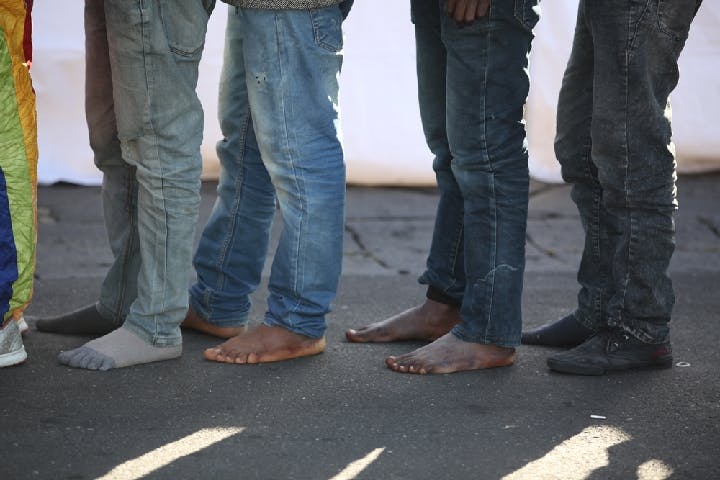Unwelcome: Why is cosmopolitan Italy so anti-immigrant?
– Carlo Massimo
A wilting economy and a bleak future are hardly conducive to hospitality for refugees and immigrants.
The refugees pouring into Europe from the Middle East are facing a cold welcome, and not just in Hungary, where Prime Minister Viktor Orban has declared the migrants a threat to European existence. In Italy, where 50,000 migrants have arrived in 2015 alone, anti-migrant feelings are running dangerously high. Xenophobia is on the rise, and it channels a general unrest in Italy — an anger over a withering economy, and anxiety about Italy’s future.
Right-wing parties have spearheaded the anti-migrant revolt, from openly neofascist groups like CasaPound and Forza Nuova to the mainstream Northern League, a separatist party whose racism is more or less an open secret. This summer, CasaPound activists led citizens from the town of Casale San Nicola in an anti-immigration protest that turned violent, leaving fourteen government agents injured.
But even in more moderate circles, large numbers of Italians are watching the human wave with distrust. Nicholas Farrell summed up many of the Italians’ frustrations for Spectator: the scene along Italy’s coastline looks like 1940 evacuation of Dunkirk, but more chaotic and with no end in sight. In the asylum camps, migrants receive not only room and board, but money, cell phones, and vocational lessons; many of the migrants, on top of that, have proven unwilling to abide by certain laws, often refusing to have their fingerprints taken. The police merely shrug their shoulders.
Social media like Facebook and Twitter are boiling over with anti-immigration chain posts and memes, some joking that the Italian armed forces are the only military in the world that exists to assist foreign invasions. Others report stories of immigrants abusing their privileges, or worse – robbing, harassing, or threatening honest Italians.
These memes have the same hysterical ring, and the same whiff of unfounded authority, as British politician Enoch Powell’s 1968 “Rivers of Blood” speech. “In this country, in ten or fifteen years’ time,” the Tory parliamentarian said, “the black man will have the whip hand over the white man.” Powell claimed that this line came verbatim from one of his constituents, an unassuming, blue-collar family man. It’s a line you could easily hear today, though, on the streets of Milan or Rome.
Italians on the left have had their hands full combatting the wave of xenophobia and racism. In a country with a deep and abiding Catholic tradition, they find a powerful ally in Pope Francis, who makes a moral argument urging Europeans to show greater hospitality toward the migrants and refugees.
Others in Italy have countered the anti-immigrant reaction from a pragmatic angle. Mass migration to Europe, according to their calculations, may indeed save the continent.
For Repubblica, Maurizio Ricci wrote this week that foreign labor and foreign families will prove crucial to maintaining the economy of a country whose population is in steep decline. Currently, there are four working Italians for every pensioner; in 2050, if current population trends continue, there will be only two. Europe will need 42 million new workers by 2020, Ricci claims, to maintain the pensions that support an aging continent. Young workers and young families from abroad can provide that new blood.
Ricci also defends the fiscal impact of migration to Italy. Quoting Jean-Christophe Dumont of the Organization for Economic Co-operation and Development (OECD), Ricci writes that immigrants are not taking money from the state, but actually filling the public coffers. In Italy, Prime Minister Matteo Renzi’s government would be out some seven billion euro without the contributions of immigrants.
Ricci and Dumont’s arguments are strong, but the message has had little resonance on the Italian street.
Saddled with tremendous debt, and tethered to a currency whose value the government cannot adjust, Italy’s prospects have been bleak for more than a decade. Unemployment stands officially at 12.7 percent, but after Berlusconi and the introduction of short-term contracts, many workers listed as employed cannot rely on a guaranteed long-term salary. Young Italians are fleeing in droves to Britain, Germany, and the United States.
It’s a humiliating state of affairs; many Italians feel continually betrayed, both by the Germans who hold the reins in the Eurozone, and by their own politicians, who are notoriously corrupt. With paltry or nonexistent wages, a hypocritical government that insists on austerity, and an inflated cost of living, it’s little wonder that so many Italians resent the migrants, who pay no rent and receive money without working.
It’s not a particularly well-informed position, of course. For one thing, it ignores the misery that the refugees are escaping, and the continued miseries of their exile in Europe.
Worse, it feeds on a strain of racism that has infected Italian politics for decades. Northern League politician Roberto Calderoli once famously referred to blacks as “bingo-bongos,” as though immigrants from Senegal or Cameroon arrived in Italy with bones stuck through their noses, or at best like the clownish black stereotypes in Birth of a Nation. Calderoli’s party came to power in the 1980s as a kind of white nationalist movement, promising to free northern cities of foreigners, especially blacks and Middle Easterners (as well as Southern Italians, who don’t quite make the cut in the League’s standard of whiteness).
This year, a town in the Abruzzo was filmed greeting its newly-elected mayor with fascist salutes. CasaPound, whose activists sparked the riot in Casale San Nicola, consider themselves fascists for the third millennium.
Despite these spectacles, the anti-immigration mood in Italy is not primarily about race, or nation. It’s about economics, the way the Italian house is run: wages and pensions and education and tax. Europe is still in dire trouble. The trials of its migrants brings that much into focus.
* * *
Further reading:
Maurizio Ricci, “Lavorano e fanno figli: così i migranti finanziano l’Europa,” Repubblica, 8 September 2015.
Photo courtesy of International Federation of the Red Cross
